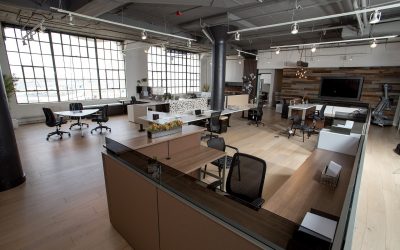Safe Disinfection Processes for Each Business
Businesses or employers are responsible for the health of their employees (they should be), be it during a time of pandemic or not, keeping the office clean should be part of its priorities. But what are the best and safe ways to disinfect the office? Searching for the “best way to disinfect your office” over the web will deliver you a lot of links and reports that are mostly “greek” to you or even unhelpful in what you really need. Your office housekeeping staff might not be well informed of the various disinfection processes or techniques and information for sanitation compliance might not be very clear with the Department of Health. Well, you are in luck because we’re here to share with you the best and safe disinfection processes for each business:
Need something cleaned?
Pat down / Wipe down
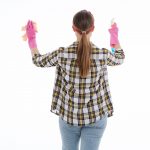 This is a process wherein you use a washcloth/mop damped with disinfectant (dilluted or concentrated) on surfaces. You can do this after a general or deep cleaning of your office, or at the same time during that process. If you have the manpower, this is the most economical, since disinfectants and chlorine based liquids are available almost anywhere.
Type of Office:
This is a process wherein you use a washcloth/mop damped with disinfectant (dilluted or concentrated) on surfaces. You can do this after a general or deep cleaning of your office, or at the same time during that process. If you have the manpower, this is the most economical, since disinfectants and chlorine based liquids are available almost anywhere.
Type of Office:
- Any type of office that are NON-carpeted
- Easy and fast to apply
- Kills bacteria and viruses (depending on the disinfectant)
- Dry surface outcome
- Does not affect office equipment (depending on the application)
- Does not affect smoke alarms
- Safe for Humans, Pets, and Plants (depending on the application)
- Area is safe to use after application
- Hard to apply on ceilings
- Effective disinfection depends on the technique of the person doing it
- Effectivity does not last a day
Spray Disinfection
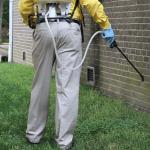 As the name implies, a mechanical or electric spray is used in the this process. The objective of this process is to disperse the liquid disinfectant on surfaces. The action and effectivity of disinfection depends highly on the disinfectant used. With the tool or machine, it can reach more areas as compared to doing a pat down/wipe down disinfection, however, the end result – wet surfaces. Wiping down the disinfectant would mean less effect on killing bacteria and viruses, so you have to wait until it dries up. This is not good on carpets as it might give out a nasty smell after a few days. It may also affect office computers and outlets.
Type of Office:
As the name implies, a mechanical or electric spray is used in the this process. The objective of this process is to disperse the liquid disinfectant on surfaces. The action and effectivity of disinfection depends highly on the disinfectant used. With the tool or machine, it can reach more areas as compared to doing a pat down/wipe down disinfection, however, the end result – wet surfaces. Wiping down the disinfectant would mean less effect on killing bacteria and viruses, so you have to wait until it dries up. This is not good on carpets as it might give out a nasty smell after a few days. It may also affect office computers and outlets.
Type of Office:
- Non-carpeted offices
- Offices with minimal electronics
- Kills bacteria and viruses (depending on the disinfectant)
- Does not affect smoke alarms
- Safe for Humans (depending on the application)
- Effective up to 3 days (or until the surface is moist with disinfectant)
- Messy preparation
- Wet surface outcome
- May affect office computers and outlets
- Unsafe for pets and plants
- Area not accessible after application
- Effective disinfection depends on the technique of the person doing it
Hot Fogger
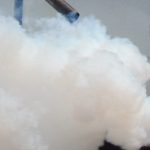 This type of disinfection is unique compared to the rest, as it utilizes fog or fumes instead of liquid or aerosol. The process involve heating oil or water based disinfectants to disperse it as fog or fume, effectively dispersing it on more surface area. When using the correct disinfecting liquid solution that is manufactured for this type of equipment, you can achieve a good disinfection, however, the process may trigger the smoke alarm (due to the fog/fumes). The fumes are also in the area for an hour or more, so it would be impossible to use the area after the process. The fumes can also cause respiratory illnesses that affects humans, animals and plants.
Type of Office:
This type of disinfection is unique compared to the rest, as it utilizes fog or fumes instead of liquid or aerosol. The process involve heating oil or water based disinfectants to disperse it as fog or fume, effectively dispersing it on more surface area. When using the correct disinfecting liquid solution that is manufactured for this type of equipment, you can achieve a good disinfection, however, the process may trigger the smoke alarm (due to the fog/fumes). The fumes are also in the area for an hour or more, so it would be impossible to use the area after the process. The fumes can also cause respiratory illnesses that affects humans, animals and plants.
Type of Office:
- All types of offices
- Can reach ceilings and hard to reach areas with proper technique
- Dry surface outcome
- Kills bacteria (depending on the disinfectant, may include viruses)
- Effective up to 3 days (or until the odor of the fume is distinct)
- Triggers smoke alarm
- May affect office computers and outlets
- Unsafe for humans, pets and plants
- Area not accessible for an hour or so after application
- Effective disinfection depends on the technique of the person doing it
Cold Fogger/Cold Microdroplets
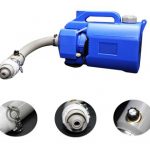 This type of disinfection process utilizes a special machine that delivers the liquid disinfectant into microdroplets upon release. It’s almost similar with the spray disinfection but you get a less wet and less moist outcome. It does this by letting the liquid pass through a controlled airflow or blower (instead of pressurizing it or heating it) which results in microdroplet dispersal. It does not affect the quality of the disinfectant and it can reach a lot of surface area as well.
Type of Office:
This type of disinfection process utilizes a special machine that delivers the liquid disinfectant into microdroplets upon release. It’s almost similar with the spray disinfection but you get a less wet and less moist outcome. It does this by letting the liquid pass through a controlled airflow or blower (instead of pressurizing it or heating it) which results in microdroplet dispersal. It does not affect the quality of the disinfectant and it can reach a lot of surface area as well.
Type of Office:
- All types of offices
- Easy and fast to apply
- Can reach ceilings and hard to reach areas with proper technique
- Kills bacteria and viruses
- Does not affect smoke alarms
- Does not affect office computers and outlets
- Safe for Humans, pets and plants (depending on the application)
- Area is accessible after the disinfection process
- Effective up to 3 days
- Effective disinfection depends on the technique of the person doing it
Charged Microdroplets
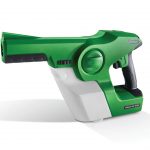 This is a specialized or evolved form of the cold fogger and perhaps the most effective and efficient way of disinfecting your office. The process involves charging/ionizing the microdroplets – magnetizing it with a similar charge so that it repels each other giving a better diffusion (scatters in spaces better), at the same time, it attracts bacteria and viruses. Because the microdroplet are greatly charged, it sticks to walls and surfaces, so what you have is the disinfectant, the bacteria and virus, all glued hard to the wall or surface, and still with enough charge to attract more bacteria and virus to the disinfectant. That is a total disinfection technology that is now available to us all.
Type of Office:
This is a specialized or evolved form of the cold fogger and perhaps the most effective and efficient way of disinfecting your office. The process involves charging/ionizing the microdroplets – magnetizing it with a similar charge so that it repels each other giving a better diffusion (scatters in spaces better), at the same time, it attracts bacteria and viruses. Because the microdroplet are greatly charged, it sticks to walls and surfaces, so what you have is the disinfectant, the bacteria and virus, all glued hard to the wall or surface, and still with enough charge to attract more bacteria and virus to the disinfectant. That is a total disinfection technology that is now available to us all.
Type of Office:
- Non-carpeted offices
- Offices with minimal electronics
- Easy and fast to apply
- Can reach ceilings and hard to reach areas with proper technique
- Kills bacteria and viruses
- Does not affect smoke alarms
- Does not affect office computers and outlets
- Safe for Humans, pets and plants (depending on the application)
- Area is accessible after the disinfection process
- Effective up to 30 days (without human interference within those days)
- Effective disinfection depends on the technique of the person doing it
More Related cleaning tips below:
How To: Clean Up Your Home After Flood
Having your home flooded is already worrisome, aside from the possible property damage, cleaning up after is difficult. Here are some tips to help you clean your home after it got flooded.
Preparing Your Office for the New Normal
The pandemic has already made things hard for everybody, getting back and transitioning to the “new normal” at work should be made easy.
Difference of Cleaning, Sanitizing and Disinfecting Spaces
Are you doing the right thing when it comes to treating and cleaning your space? Know the difference between cleaning, sanitizing and disinfecting spaces.


